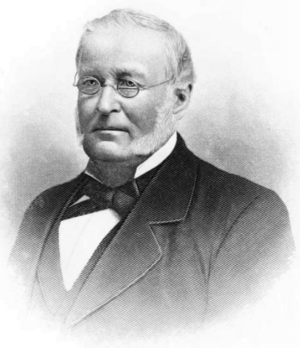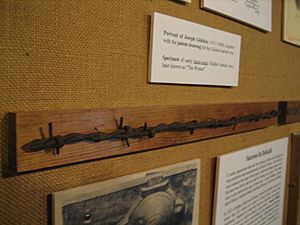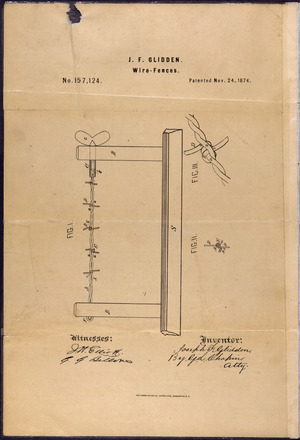Joseph Glidden facts for kids
Quick facts for kids
Joseph Glidden
|
|
|---|---|
 |
|
| Born | January 18, 1813 |
| Died | October 9, 1906 (aged 93) DeKalb, Illinois, U.S.
|
| Resting place | Fairview Cemetery, DeKalb, Illinois |
| Occupation | Teacher, farmer, inventor, businessman |
| Spouse(s) | Clarissa Foster (1837–1843) Lucinda Warne (1850–1895) |
| Children | 3 |
| Signature | |
Joseph Farwell Glidden (born January 18, 1813 – died October 9, 1906) was an American farmer and smart businessman. He is famous for inventing the modern barbed wire, which changed farming and ranching forever. In 1898, he generously gave land for a school in DeKalb, Illinois. This school later became Northern Illinois University.
Contents
Early Life and Family
Joseph Glidden was born in Charlestown, New Hampshire. His family later moved to Clarendon, New York. Joseph worked as a teacher for about eight years. In 1837, he married Clarissa Foster.
In 1843, he moved to Illinois with his family. They first lived in Ogle County before buying a farm in DeKalb. After his first wife passed away, Joseph married Lucinda Warne in 1851. They had one daughter named Elva Frances.
Inventing Barbed Wire
In 1873, Joseph Glidden started working on a better way to make barbed wire. Farmers needed strong fences to keep their cattle in place. He used a coffee mill to help create the sharp points, or "barbs."
"The Winner" Design
Glidden's best design was called "The Winner." He placed the barbs along one wire. Then, he twisted a second wire around it. This made sure the barbs stayed firmly in place. This design was very strong and effective.
On November 24, 1874, when he was 61 years old, Glidden received a patent for his barbed wire design. A patent means he had the legal right to his invention.
Building a Business
Joseph Glidden teamed up with Isaac L. Ellwood, a local hardware dealer. They started a company called the Barb Fence Company in DeKalb, Illinois. They began making and selling "The Winner" barbed wire.
In 1876, Glidden sold his share of the manufacturing business. However, he still earned money from his patent. Ellwood continued the company, which later became American Steel and Wire. This company was eventually bought by U.S. Steel.

Glidden's invention made him very wealthy. It's estimated he earned a lot of money from his patent until it expired in 1892. By the time he passed away in 1906, he was one of the richest people in America. He owned a hotel, a newspaper, and thousands of acres of farmland in Illinois and Texas.
Community and Business Activities
Joseph Glidden was also active in his community. He held several important roles:
- From 1852 to 1854, he served as the sheriff of DeKalb County.
- He was on the county's board of supervisors for many years.
- He helped organize the DeKalb County Fair.
- He was a member of the school board for 13 years. He also paid the most school tax in the county for 20 years.
- He helped pay for building a church.
- He was vice-president of the DeKalb National Bank.
- He was a director for the North Western Railroad.
- He owned the DeKalb Rolling Mill.
Barbed Wire Changes Ranching
Barbed wire was a huge change for ranchers, especially in places like Texas. Before barbed wire, it was hard to keep large herds of cattle in one area.
The Frying Pan Ranch Demonstration
In 1881, Glidden and his sales agent, Marques Fortner, started the "Frying Pan Ranch" in Bushland, Texas. This ranch was used to show how well barbed wire worked. They brought the wire by wagon and used wood from nearby canyons for fence posts.
They fenced in 12,000 cattle. This ranch proved that barbed wire was a great way to manage large herds. It completely changed how ranching was done.
Railroads also bought a lot of barbed wire. They used it to fence their tracks. This stopped cattle from wandering onto the tracks and causing accidents.
The Frying Pan Ranch grew to have 15,000 cattle and covered even more land. In 1898, Glidden gave the Frying Pan Ranch to his son-in-law, William Henry Bush.
Supporting Education
Joseph Glidden, who used to be a teacher himself, cared a lot about education. He donated 63 acres of his land to be the site for the Northern Illinois State Normal School.
The school opened on September 12, 1898. It started with 139 students and 16 teachers. In 1957, the school's name was changed to Northern Illinois University.
The town of Glidden, Iowa, is named in his honor.
Personal Life
Joseph Glidden and his second wife, Lucinda, had one daughter, Elva Frances, in 1851. Elva married William Henry Bush in 1877. Lucinda passed away in 1895. Elva passed away in 1906, shortly before her father. Both are buried in the Glidden family plot in DeKalb.
See also
- Joseph F. Glidden House
- The Barbed Wire Patent
Patents
- U.S. Patent 157,124 – Wire fences


